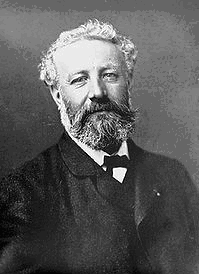Around the World in Eighty Days
Jules Gabriel Verne (February 8, 1828- March 24, 1905) was a French author from Brittany who pioneered the science-fiction genre. He is best known for novels such as Twenty Thousand Leagues Under the Sea (1870), A Journey to the Center of the Earth (1864), and Around the World in Eighty Days (1873). Verne wrote about space, air and underwater travel before air travel and practical submarines were invented, and before practical means of space travel had been devised. He is the third most translated individual author in the world. Some of his books have also been made into films. Verne, along with Hugo Gernsback and H. G. Wells, is often popularly referred to as the “Father of Science Fiction”.
Verne wrote numerous works, most famous of which are the 54 novels comprising the Voyages Extraordinaires. He also wrote short stories, essays, plays, and poems.
His better known works include:
• Five Weeks in a Balloon
• Paris in the 20th Century
• A Journey to the Center of the Earth
• From the Earth to the Moon
• Journeys and Adventures of Captain Hatteras
• Twenty Thousand Leagues Under the Sea
• Around the World in Eighty Days
• Facing the Flag
• Master of the World
• The Lighthouse at the End of the World
Around the World in Eighty Days is a classic adventure novel by the French writer Jules Verne, first published in 1873. In the story, Phileas Fogg of London and his newly employed French valet Passepartout attempt to circumnavigate the world in 80 days on a £20,000 wager set by his friends at the Reform Club. It is one of Verne’s most acclaimed works.
The story starts in London on October 2, 1872. Phileas Fogg is a rich English nobleman bachelor living in solitude at Number 7 Savile Row, Burlington Gardens. Despite his wealth, Mr. Fogg lives a modest life with habits carried out with mathematical precision. Very little can be said about Mr. Fogg’s social life other than he is a member of the Reform Club. Having dismissed his former valet, James Foster, for bringing him shaving water at 84 °F instead of 86 °F, Mr. Fogg hires a Frenchman by the name of Jean Passepartout, who is about 30 years old, as a replacement.
Later, on that day, in the Reform Club, Fogg gets involved in an argument over an article in The Daily Telegraph, stating that with the opening of a new railway section in India, it is now possible to travel around the world in 80 days. He accepts a wager for £20,000 from his fellow club members, which he will receive if he makes it around the world in 80 days. Accompanied by Monsieur Passepartout, he leaves London by train at 8:45 P.M. on October 2, 1872, and thus is due back at the Reform Club at the same time 80 days later, on December 21.
The main plot is based on Fogg’s travels, while other such plots merely support the central theme. Fix, the detective follows Fogg all over, believes that Fogg is the bank robber who has robbed a great sum from the bank of England. He puts obstacles in Fogg’s path just so that he can arrest him whenever he gets the warrant from England. The suspicion that Fogg might be a clever gentleman robber is the sub-theme of the book and the author makes the reader also suspicious. Passepartout too wonders whether his master might be a robber though in his heart he has ample trust in Fogg’s integrity.
The plot moves ahead with Fogg striving through various obstacles to reach London in time. He goes through Brindisi, Suez, Bombay, Calcutta, Hong Kong, Yokohama, San Francisco, New York and finally Liverpool. Fix arrests Fogg at Liverpool and this delays our hero. He thinks that he has missed the deadline and hasn’t reached London in time when in reality he reached a full day earlier. Thus Fogg wins the wager and in the course of his travels, finds himself a worthy charming, beautiful wife too.
Around the World in Eighty Days was written during difficult times, both for France and for Verne. It was during the Franco-Prussian War (1870–1871) in which Verne was conscripted as a coastguard, he was having money difficulties (his previous works were not paid royalties), his father had died recently, and he had witnessed a public execution which had disturbed him. However despite all this, Verne was excited about his work on the new book, the idea of which came to him one afternoon in a Paris café while reading a newspaper.
The technological innovations of the 19th century had opened the possibility of rapid circumnavigation and the prospect fascinated Verne and his readership. In particular three technological breakthroughs occurred in 1869-1870 that made a tourist-like around-the-world journey possible for the first time: the completion of the First Transcontinental Railroad in America (1869), the linking of the Indian railways across the sub-continent (1870), and the opening of the Suez Canal (1869). It was another notable mark in the end of an age of exploration and the start of an age of fully global tourism that could be enjoyed in relative comfort and safety. It sparked the imagination that anyone could sit down, draw up a schedule, buy tickets and travel around the world, a feat previously reserved for only the most heroic and hardy of adventurers.
2. “Jules Verne’s masterpiece ... stimulated our childhood and taught us more than all the atlases: the taste of adventure and the love of travel. ‘Thirty thousand banknotes for you, Captain, if we reach Liverpool within the hour.’ This cry of Phileas Fogg’s remains for me the call of the sea.” (Jean Cocteau, Mon premier voyage (Tour du monde en 80 jours), Gallimard, 1936).
3. “Jules Verne’s work is nothing but a long meditation, a reverie on the straight line---which represents the predication of nature on industry and industry on nature, and which is recounted as a tale of exploration. Title: the adventures of a straight line ... The train... cleaves through nature, jumps obstacles ... and continues both the actual journey---whose form is a furrow---and the perfect embodiment of human industry. The machine has the additional advantage here of not being isolated in a purpose-built, artificial place, like the factory or all similar structures, but of remaining in permanent and direct contact with the variety of nature.”(Pierre Macherey, 1966).
附件列表
词条内容仅供参考,如果您需要解决具体问题
(尤其在法律、医学等领域),建议您咨询相关领域专业人士。
如果您认为本词条还有待完善,请 编辑
上一篇 Offering help 下一篇 用英语询问洗手间


